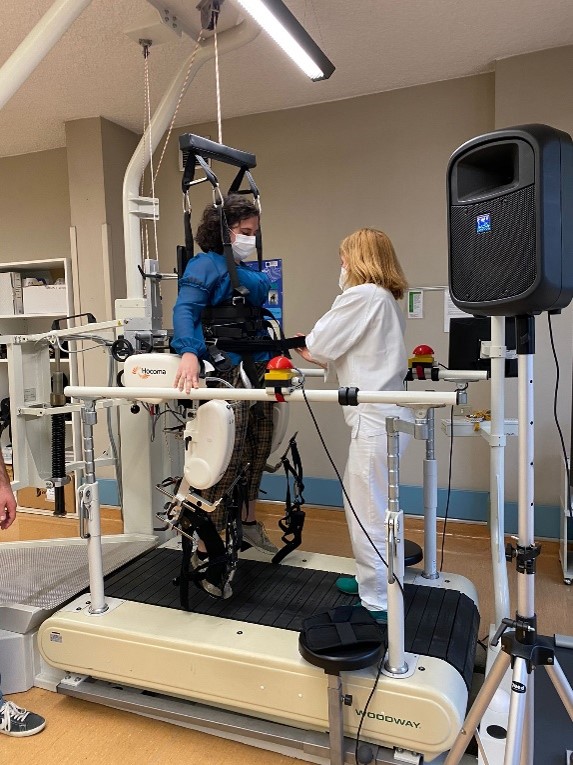Master presentation at RehabWeek
Prof. Alessandra Pedrocchi will present the Rehabtech Master at the RehabWeek in Rotterdam during the MiNT-IISART …



Second edition















The goal of this Master is to create a school able to provide transdisciplinary skills to the most relevant players in the field of technologies for rehabilitation, home care, and empowerment of disabled and fragile people. Technologies must become a multiplier and extension of human resources, of the ability to organize and deliver a service, a resource to improve the care interaction, to relieve or limit the psychophysical overload in the activities of care and rehabilitation assistance by formal and informal caregivers, having the patient and his/her needs at the center of the whole process.
This topic requires a strong interaction – a cultural dialogue of professional figures with different backgrounds that need to work together, among which we identify (in a non-exclusive way):


Consequently, it is characterized by evident gaps:
The proposal of this Master is to integrate a group of professional figures with different backgrounds into a classroom and to build common knowledge and a comprehensive full-fledged understanding of the problems and challenges related to the real integration of technologies in the rehabilitation clinic and in the management of the continuity of care and social inclusion. In this way, we can speed up the real impact of these technologies in the lives of patients, their families, and clinical professionals.
The teaching will deal with the understanding of the medical bases of the neurorehabilitation path, the design of the requirements, and technical specifications of technologies and robotics in rehabilitation (including robotics, artificial intelligence, neurostimulation, neuroplasticity, and virtual reality). The program will then address the study of industrial transfer processes, technological evaluation, and innovation. Translational research methodologiesand evidence-based medicine will be addressed. The patient will be at the center of the teaching through appropriate ethical and engagement considerations. The path will conclude with the study of organizational models of some European countries with the purpose of delivering innovative services.
The Master is organized in a blended form. It consists of 12 modules, 8 online and 4 on-site (i.e., frontal lessons). The on-site modules correspond to 4 long weekends (Thursday-Saturday).
The Master consists of 60 ECTS.
In particular, the online modules consist of:
The on-site modules, instead, consist of 3 full days of lectures, round tables, laboratory activities, visits to laboratories, rehabilitation centers, or companies.
The Master is completed with a final project work, done in small groups, associated with a clinical reality and followed by a tutor. It will involve the use of new technologies in rehabilitation, and the definition of translational research protocols for the institution visited (selected by the student from a clinical center, start-up, investment fund, or research laboratory).
Minimum attendance percentage: minimum percentage of attendance to the course of 70% is foreseen
Content/modality of eventual final exam: Project work with a final discussion
The biological bases of function recovery will be introduced with a focus on the musculoskeletal system, the central nervous system, and the upper cortical functions. The activity will include the presentation of the scientific rationale of rehabilitation, translated into the application logic, and field activities. The module offers the common starting point, while the development of clinical principles will then be deepened in all subsequent modules.
Technologies for diagnostics and rehabilitation will be presented and discussed. The unit will include examples of technologies supporting the rehabilitation treatments, with a focus on functional assessment (kinematics and electromyography) in laboratory and through wearable sensorsand the use of neuroimaging in diagnostics and in the study of neural correlates of motor recovery. Data analysis methodologies for the personalization of rehabilitation therapy will also be illustrated, including Machine Learning techniques and Artificial Intelligence for the comparative analysis of multimodal data.
This unit aims to provide methods and case studies for the definition of technical specifications for the design and implementation of technologies for rehab. Rehabilitation and robotic technologies for the upper limb, lower limbs, and cognitive rehabilitation will be presented and discussed. This unit includes mutiple modules, on Robotics, Neuroprostheses, Technologies for patients with neuromuscular diseases with severe disabilities, Telerehabilitation and digital technologies for home and school care, Virtual and extended reality, and Instruments for perception and proprioceptive training. All the technologies will be presented starting from the clinical principles, to the definition of the technical specifications up to the reasoned discussion of the devices available on the market, the most relevant research activities, and the most promising directions.
In this unit, human factors and health technologies in the life cycle will be presented. Principles of health psychology are introduced and the psychological implications of taking care of others and ourselves will be discussed. The unit will also address clinician – patient communication, ethics in rehabilitation, and the role of the ethical committee and technology in promoting research and guaranteeing people. The importance of the human sciences in clinical practice will be remarked.
The essential elements for technology transfer and intellectual property protection will be presented. The unit aims to provide methodologies for the design of clinical trials and systematic reviews, and basics of Health Technology Assessment.
The managerial organization for the introduction of new high-tech services and industrial experiences for effective clinical uptake will be discussed.
Focus on the Italian, Swiss, or Spanish healthcare system (eligible).
The Master also includes 2 online modules MOOCs (Massive Online Open Course), which focus on soft skills (communication, interdisciplinary team management, conflict management), created by METID PoliMI (Methods and Innovative Technologies for Didactics).
This edition will include one-week Internship at partner institutions available for the best students, to have a personalized hands-on experience.
This extra experience is not mandatory to get the title.
Prof. Alessandra Pedrocchi will present the Rehabtech Master at the RehabWeek in Rotterdam during the MiNT-IISART …
The call for the Rehabtech Master have been published on the institutional website of the Politecnico di Milano…